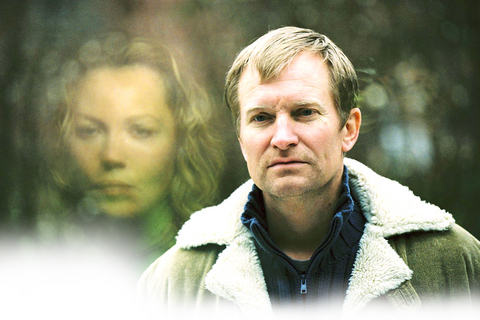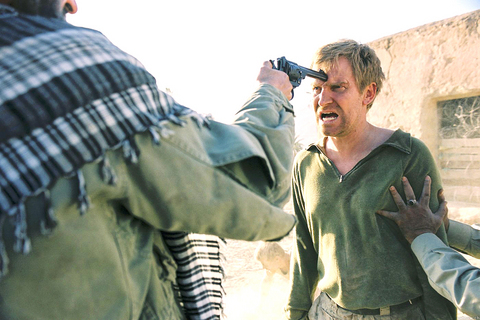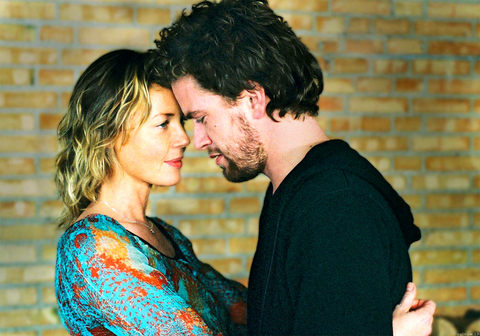The Danish filmmaker Suzanne Bier's gripping psychological drama Brothers is her second film to examine events worthy of Greek tragedy through a contemporary therapeutic lens. This is not to suggest that the traumas the main characters in both films suffer are any less devastating than those that leave the stage littered with corpses at the end of a classic play, or that either film goes soft and mushy with healing psychobabble, but that modern life offers alternatives to life-and-death solutions; in both films, those solutions are neither easy nor assured.
In Open Hearts, her first collaboration with the screenwriter Anders Thomas Jensen, and in Brothers, a man's life is abruptly shattered by a sudden, fateful event. The protagonist of the earlier movie is a vigorous young athlete about to be married, who is paralyzed from the neck down in a freak accident. Michael (Ulrich Thomsen), the wounded hero of Brothers, is an officer in the Danish contingent of UN forces in Afghanistan. After his truck crashes, he is presumed dead. Captured by guerrillas, he is imprisoned and forced to carry out an atrocity that leaves him a broken man. When he returns to his wife, Sarah (Connie Nielsen), and two daughters in Denmark, he is seething with rage and guilt.
With a fine balance of compassion and hardheadedness, both movies explore the shattering of an illusion entertained by men, more than by women, of their godlike autonomy, and their reflexive fury at its sudden loss. In Open Hearts, fate arrives with the swing of a car door. In Brothers, it is an enemy captor's nonnegotiable demand that a soldier, to save his own life, violate every principle of wartime behavior that has been instilled in him.

PHOTOS COURTESY OF FOX MOVIES
Onto this already anguished scenario, Brothers grafts a volatile family dynamic straight out of R. D. Laing. Michael, a virtuous straight arrow and family man, is his father's favorite of two sons. His younger brother, Jannik (Nikolaj Lie Kaas), is a drunken wastrel who, as the movie begins, has just been released from prison after committing a petty crime.
Without straining for effect, Brothers shows you how comfortably (and unconsciously) the two brothers act out their assigned roles of good son and bad son. As much as Jannik loves Michael, he bitterly resents him. For his part, Michael plays Jannik's magnan-imous caretaker with a little too much self-regard for comfort.
Michael's presumed death changes the balance of power virtually overnight, and Jannik begins to blossom. In his brother's absence, he becomes a surrogate father to Michael's two daughters. And he and Sarah form a friendship that momentarily slips into something more (a tentative kiss) from which both withdraw in embarrassment, viewing their lapse as an expression of their shared love for Michael. When Michael arrives home, distraught, guilty and no longer in total control, the changed balance of power triggers his suspicion and boiling jealousy.

PHOTO COURESY OF FOX MOVIES
We have all observed families whose members act out their designated roles (as Laing theorized) in a psychodrama that functions as a closed system. One reason Brothers is such a harrowing experience to watch is that Michael's increasingly irrational behavior rings so painfully true. Only at the very end does the movie, which is determined not to be a closed Laingian system, seem a bit tentative.
Filmed in the unadorned Dogme style and acted with a ferocious intensity, Brothers poses a special challenge for Nielsen (familiar to us from American films like Gladiator and The Devil's Advocate), whose character finds herself circled by emotional tornados. In a movie whose characters flail uninhib-itedly upon the stages of their own lives, Sarah is the reactive center, forestalling chaos with the tense, instinctive calm of a woman who senses the consequences of one false move.


May 11 to May 18 The original Taichung Railway Station was long thought to have been completely razed. Opening on May 15, 1905, the one-story wooden structure soon outgrew its purpose and was replaced in 1917 by a grandiose, Western-style station. During construction on the third-generation station in 2017, workers discovered the service pit for the original station’s locomotive depot. A year later, a small wooden building on site was determined by historians to be the first stationmaster’s office, built around 1908. With these findings, the Taichung Railway Station Cultural Park now boasts that it has

The latest Formosa poll released at the end of last month shows confidence in President William Lai (賴清德) plunged 8.1 percent, while satisfaction with the Lai administration fared worse with a drop of 8.5 percent. Those lacking confidence in Lai jumped by 6 percent and dissatisfaction in his administration spiked up 6.7 percent. Confidence in Lai is still strong at 48.6 percent, compared to 43 percent lacking confidence — but this is his worst result overall since he took office. For the first time, dissatisfaction with his administration surpassed satisfaction, 47.3 to 47.1 percent. Though statistically a tie, for most

Wooden houses wedged between concrete, crumbling brick facades with roofs gaping to the sky, and tiled art deco buildings down narrow alleyways: Taichung Central District’s (中區) aging architecture reveals both the allure and reality of the old downtown. From Indigenous settlement to capital under Qing Dynasty rule through to Japanese colonization, Taichung’s Central District holds a long and layered history. The bygone beauty of its streets once earned it the nickname “Little Kyoto.” Since the late eighties, however, the shifting of economic and government centers westward signaled a gradual decline in the area’s evolving fortunes. With the regeneration of the once

In February of this year the Taipei Times reported on the visit of Lienchiang County Commissioner Wang Chung-ming (王忠銘) of the Chinese Nationalist Party (KMT) and a delegation to a lantern festival in Fuzhou’s Mawei District in Fujian Province. “Today, Mawei and Matsu jointly marked the lantern festival,” Wang was quoted as saying, adding that both sides “being of one people,” is a cause for joy. Wang was passing around a common claim of officials of the People’s Republic of China (PRC) and the PRC’s allies and supporters in Taiwan — KMT and the Taiwan People’s Party — and elsewhere: Taiwan and